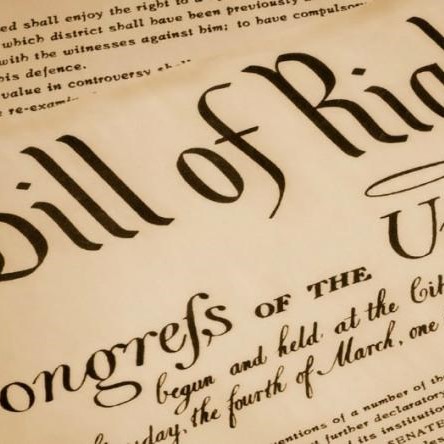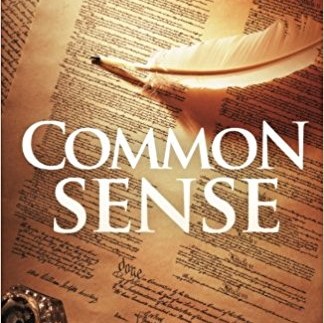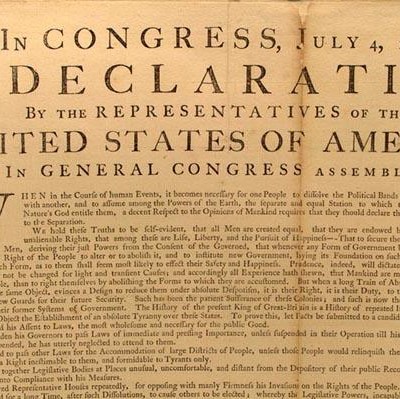
BILL OF RIGHTS OF THE UNITED STATES OF AMERICA (1791)
The first 10 amendments to the Constitution make up the Bill of Rights. James Madison wrote the amendments, which list specific prohibitions on governmental power, in response to calls from several states for greater constitutional protection for individual liberties. For example, the Founders saw the ability to speak and worship freely as a natural right protected by the First Amendment. Congress is prohibited from making laws establishing religion or abridging freedom of speech. The Fourth Amendment safeguards citizens’ right to be free from unreasonable government intrusion in their homes through the requirement of a warrant.
The Bill of Rights was strongly influenced by the Virginia Declaration of Rights, written by George Mason. Other precursors include English documents such as the Magna Carta, the Petition of Right, the English Bill of Rights, and the Massachusetts Body of Liberties.
One of the many points of contention between Federalists, who advocated a strong national government, and Anti-Federalists, who wanted power to remain with state and local governments, was the Constitution’s lack of a bill of rights that would place specific limits on government power. Federalists argued that the Constitution did not need a bill of rights, because the people and the states kept any powers not given to the federal government. Anti-Federalists held that a bill of rights was necessary to safeguard individual liberty.
Madison, then a member of the U.S. House of Representatives, altered the Constitution’s text where he thought appropriate. However, several representatives, led by Roger Sherman, objected, saying that Congress had no authority to change the wording of the Constitution. Therefore, Madison’s changes were presented as a list of amendments that would follow Article VII.
The House approved 17 amendments. Of these, the Senate approved 12, which were sent to the states for approval in August 1789. Ten amendments were approved (or ratified). Virginia’s legislature was the final state legislature to ratify the amendments, approving them on December 15, 1791.
THE BILL OF RIGHTS – FULL TEXT
Amendment I
Amendment II
Amendment III
Amendment IV
Amendment V
Amendment VI
Amendment VII
Amendment VIII
Amendment IX
Amendment X

Common Sense - Thomas Paine
In Common Sense, Thomas Paine argues for American independence. His argument begins with more general, theoretical reflections about government and religion, then progresses onto the specifics of the colonial situation. Paine begins by distinguishing between government and society. Society, according to Paine, is everything constructive and good that people join together to accomplish. Government, on the other hand, is an institution whose sole purpose is to protect us from our own vices. Government has its origins in the evil of man and is therefore a necessary evil at best. Paine says that government's sole purpose is to protect life, liberty and property, and that a government should be judged solely on the basis of the extent to which it accomplishes this goal.
Paine then considers an imagined scenario in which a small group of people has been placed on an island, and cut off from the rest of society. In time, these people develop ties with one another, and lawmaking becomes inevitable. Paine says the people will be much happier if they are responsible for the creation of the laws that rule them. Paine is also implicitly arguing that such a system of representation is also better for the American colonists. Having expressed his disagreement with British reign in America, Paine proceeds to launch a general attack on the British system of government. Paine says the British system is too complex and rife with contradictions, and that the monarchy is granted far too much power. The British system pretends to offer a reasonable system of checks and balances, but in fact, it does not.
From here Paine moves on to discuss, in general, the notions of monarchy and hereditary succession. Man, Pain argues, was born into a state of equality, and the distinction that has arisen between king and subject is an unnatural one. At first, Paine says, the world was without kings, but the ancient Jews decided they wanted a king. This angered God, but he allowed them to have one. Paine presents pages of biblical evidence detailing God's wrath at the idea of the Jews having a king. The conclusion Paine reaches is that the practice of monarchy originates from sin, and is an institution that the Bible and God condemn. Paine calls hereditary succession an abominable practice. He says that even if people were to choose to have a king, that does not legitimize that King's child acting as a future ruler. Furthermore, hereditary succession has brought with it innumerable evils, such as incompetent kings, corruption, and civil war.
Having dispensed with the preliminary theoretical issues, Paine sets in to discuss the details of the American situation. In response to the argument that America has flourished under British rule, and therefore ought to stay under the king, Paine says that such an argument fails to realize that America has evolved and no longer needs Britain's help. Some say that Britain has protected America, and therefore deserves allegiance, but Paine responds that Britain has only watched over America in order to secure its own economic well-being. Paine adds that most recently, instead of watching over the colonies, the British have been attacking them, and are therefore undeserving of American loyalty.
Paine says that the colonies have little to gain from remaining attached to Britain. Commerce can be better conducted with the rest of Europe, but only after America becomes independent. Paine also asserts that if the colonies remain attached to Britain, the same problems that have arisen in the past will arise in the future. Paine argues that it is necessary to seek independence now, as to do otherwise would only briefly cover up problems that will surely reemerge.
Paine even proposes the form of government that the independent colonies should adopt. His recommendation is for a representative democracy that gives roughly equal weight to each of the colonies. Paine explains why the current time is a good time to break free of Britain. Primarily, Paine focuses on the present size of the colonies, and on their current capabilities. He presents an inventory of the British Navy and gives calculations revealing how America could build a navy of comparable size. Paine recommends this as a way of ensuring America's security and prosperity in trade. Paine also argues that America is sufficiently small as to be united now. If time were to elapse, and the population of the colonies to grow, the same feeling of unity would not be present. Paine adds that if the Americans revolt now, they can use the vast expanses of uncharted land to the West in order to pay down some of the debt they will incur. Paine says that as a colony of Britain, America lacks respectability on the international scene. They are seen simply as rebels, and cannot form substantial alliances with other nations. In order to prosper in the long term, the colonies need to be independent. Paine says that, by declaring independence, America will be able to ask for the help of other countries in its struggle for freedom. For all of these reasons, Paine says it is imperative and urgent that the colonies declare independence.
Paine begins the pamphlet Common Sense with general comments about government. He observes first that people have a tendency to confuse government with society. Drawing a sharp line, Paine argues that society is always something to strive for, whereas government is "a necessary evil." Society fosters the fulfillment of our desires, while government is there only to keep man from indulging his vices. Paine says that if a country with a government is hampered by oppression, it is far worse than if such behavior were to occur on its own, since the people create and support the government, and are therefore financing their own poor condition. If all people acted morally, government would not be necessary, but since people are fallible, government is necessary to the protection of life and property. Government's fundamental purpose, therefore, is to provide security, and the success of a government is to be judged by the extent to which it fulfills this role.
To understand the purpose of government, Paine considers a small number of people, placed in a small region of land, cut off from all humanity. Unable to live alone, they would soon find themselves interacting in order to avoid a perpetual solitude. Together, they would be able to a build shelter and feed themselves more effectively. Out of necessity, the men would create a society. As long as they were to treat each other honorably, they would need no law. However, in order to account for inevitable defects in moral virtue, they would need to form a government. At first, they might simply designate some place to meet for all to discuss public matters, but as the size of the society increases, they would need to choose representatives to make the law. In order to make this work, they would need to hold frequent elections to ensure that the will of the representatives is aligned with that of the people. Paine breaks out of the world of his parable to argue that, therefore, representation, and not monarchy, is essential to "The strength of government and the happiness of the governed." Paine claims that his view of government is based on the principle "that the more simple any thing is, the less likely it is to be disordered." He then sets out to attack the British constitution. He derides it as "exceedingly complex," and rife with monarchical and aristocratic tyranny. Paine argues that, furthermore, it is absurd to think that the British system consists of branches of government checking each other.
Paine presents government as an institution whose sole function is to restrain the evil in man. Furthermore, he presents society as the force that "promotes our happiness positively". Government, then, is conceived of as simply a preventative force, while any positive or creative acts are up to society. Many Western democratic governments appropriate large sums of money toward positive projects that are intended to improve public life, and it is worth considering whether Paine would have objected to the modern state in which government "promotes our happiness…" The argument could also be made that, given the affection Paine expresses for society, he might be very fond of modern governments. After all, Paine lauds society because of what it accomplishes, and if a government could accomplish the same thing, Paine's view of government might change.
Paine claims to be using a parable to introduce his general reflections about government, although his intention is clearly to comment on the situation in America. In his parable, America is the land secluded from the rest of society, since it is separated from Europe by an ocean, and the few people placed there are the original settlers. An obvious problem with Paine's story in relation to the situation in America, however, is that America was not quite cut off from the rest of society, as many European powers controlled various territories in America. Furthermore, Paine intends to examine how government originates out of nature, but the settlers who first crossed over from England arrived with English notions of government, rather than creating the government from scratch.

The Declaration of Independence
When in the Course of human events it becomes necessary for one people to dissolve the political bands which have connected them with another and to assume among the powers of the earth, the separate and equal station to which the Laws of Nature and of Nature's God entitle them, a decent respect to the opinions of mankind requires that they should declare the causes which impel them to the separation.
We hold these truths to be self-evident, that all men are created equal, that they are endowed by their Creator with certain unalienable Rights, that among these are Life, Liberty and the pursuit of Happiness. — That to secure these rights, Governments are instituted among Men, deriving their just powers from the consent of the governed, — That whenever any Form of Government becomes destructive of these ends, it is the Right of the People to alter or to abolish it, and to institute new Government, laying its foundation on such principles and organizing its powers in such form, as to them shall seem most likely to effect their Safety and Happiness. Prudence, indeed, will dictate that Governments long established should not be changed for light and transient causes; and accordingly all experience hath shewn that mankind are more disposed to suffer, while evils are sufferable than to right themselves by abolishing the forms to which they are accustomed. But when a long train of abuses and usurpations, pursuing invariably the same Object evinces a design to reduce them under absolute Despotism, it is their right, it is their duty, to throw off such Government, and to provide new Guards for their future security. — Such has been the patient sufferance of these Colonies; and such is now the necessity which constrains them to alter their former Systems of Government. The history of the present King of Great Britain is a history of repeated injuries and usurpations, all having in direct object the establishment of an absolute Tyranny over these States. To prove this, let Facts be submitted to a candid world.
He has refused his Assent to Laws, the most wholesome and necessary for the public good. He has forbidden his Governors to pass Laws of immediate and pressing importance, unless suspended in their operation till his Assent should be obtained; and when so suspended, he has utterly neglected to attend to them.
He has refused to pass other Laws for the accommodation of large districts of people, unless those people would relinquish the right of Representation in the Legislature, a right inestimable to them and formidable to tyrants only. He has called together legislative bodies at places unusual, uncomfortable, and distant from the depository of their Public Records, for the sole purpose of fatiguing them into compliance with his measures. He has dissolved Representative Houses repeatedly, for opposing with manly firmness his invasions on the rights of the people.
He has refused for a long time, after such dissolutions, to cause others to be elected, whereby the Legislative Powers, incapable of Annihilation, have returned to the People at large for their exercise; the State remaining in the mean time exposed to all the dangers of invasion from without, and convulsions within. He has endeavoured to prevent the population of these States; for that purpose obstructing the Laws for Naturalization of Foreigners; refusing to pass others to encourage their migrations hither, and raising the conditions of new Appropriations of Lands. He has obstructed the Administration of Justice by refusing his Assent to Laws for establishing Judiciary Powers. He has made Judges dependent on his Will alone for the tenure of their offices, and the amount and payment of their salaries. He has erected a multitude of New Offices, and sent hither swarms of Officers to harass our people and eat out their substance. He has kept among us, in times of peace, Standing Armies without the Consent of our legislatures. He has affected to render the Military independent of and superior to the Civil Power.
He has combined with others to subject us to a jurisdiction foreign to our constitution, and unacknowledged by our laws; giving his Assent to their Acts of pretended Legislation: For quartering large bodies of armed troops among us: For protecting them, by a mock Trial from punishment for any Murders which they should commit on the Inhabitants of these States: For cutting off our Trade with all parts of the world: For imposing Taxes on us without our Consent: For depriving us in many cases, of the benefit of Trial by Jury: For transporting us beyond Seas to be tried for pretended offences:
For abolishing the free System of English Laws in a neighbouring Province, establishing therein an Arbitrary government, and enlarging its Boundaries so as to render it at once an example and fit instrument for introducing the same absolute rule into these Colonies For taking away our Charters, abolishing our most valuable Laws and altering fundamentally the Forms of our Governments: For suspending our own Legislatures, and declaring themselves invested with power to legislate for us in all cases whatsoever. He has abdicated Government here, by declaring us out of his Protection and waging War against us. He has plundered our seas, ravaged our coasts, burnt our towns, and destroyed the lives of our people.
He is at this time transporting large Armies of foreign Mercenaries to compleat the works of death, desolation, and tyranny, already begun with circumstances of Cruelty & Perfidy scarcely paralleled in the most barbarous ages, and totally unworthy the Head of a civilized nation. He has constrained our fellow Citizens taken Captive on the high Seas to bear Arms against their Country, to become the executioners of their friends and Brethren, or to fall themselves by their Hands. He has excited domestic insurrections amongst us, and has endeavoured to bring on the inhabitants of our frontiers, the merciless Indian Savages whose known rule of warfare, is an undistinguished destruction of all ages, sexes and conditions. In every stage of these Oppressions We have Petitioned for Redress in the most humble terms: Our repeated Petitions have been answered only by repeated injury. A Prince, whose character is thus marked by every act which may define a Tyrant, is unfit to be the ruler of a free people.
Nor have We been wanting in attentions to our British brethren. We have warned them from time to time of attempts by their legislature to extend an unwarrantable jurisdiction over us. We have reminded them of the circumstances of our emigration and settlement here. We have appealed to their native justice and magnanimity, and we have conjured them by the ties of our common kindred to disavow these usurpations, which would inevitably interrupt our connections and correspondence. They too have been deaf to the voice of justice and of consanguinity. We must, therefore, acquiesce in the necessity, which denounces our Separation, and hold them, as we hold the rest of mankind, Enemies in War, in Peace Friends.
We, therefore, the Representatives of the united States of America, in General Congress, Assembled, appealing to the Supreme Judge of the world for the rectitude of our intentions, do, in the Name, and by Authority of the good People of these Colonies, solemnly publish and declare, That these united Colonies are, and of Right ought to be Free and Independent States, that they are Absolved from all Allegiance to the British Crown, and that all political connection between them and the State of Great Britain, is and ought to be totally dissolved; and that as Free and Independent States, they have full Power to levy War, conclude Peace, contract Alliances, establish Commerce, and to do all other Acts and Things which Independent States may of right do. — And for the support of this Declaration, with a firm reliance on the protection of Divine Providence, we mutually pledge to each other our Lives, our Fortunes, and our sacred Honor.

